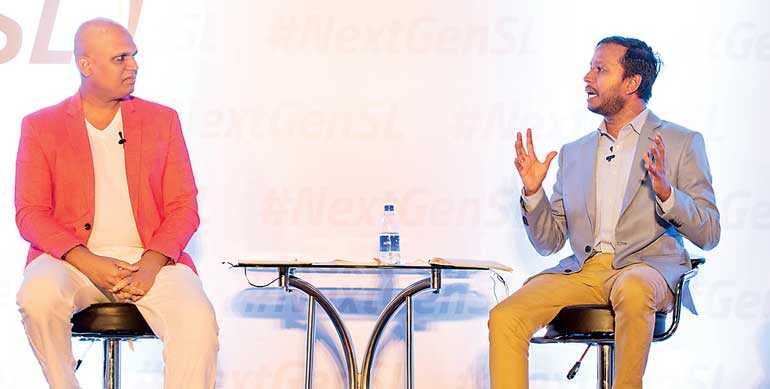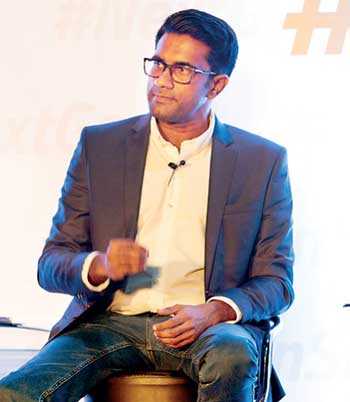Saturday Feb 14, 2026
Saturday Feb 14, 2026
Monday, 29 July 2019 00:00 - - {{hitsCtrl.values.hits}}




By Aysha Maryam Cassim
What is the NextGenSL?
A group consisting of young political activists from different political parties – united by their common will to redefine the political culture of Sri Lanka. NextGenSL gives a platform for people with conflicting ideologies to find common ground and express their respective views across the political aisle. This is more of an open discussion than a raucous debate that has made the next generation of political conversation more promising by galvanising youth into taking actions that will transform the hostile political culture that has been prevalent in the Sri Lankan political discourse for years.
Highlights from the public debate
Changing the political landscape of the country is a subject that has been profusely discussed over the last decade. As an approach to make tomorrow’s politics better and brighter, Next Gen SL held its first public debate following the aftermath of the constitutional crisis in Sri Lanka last December 2018. The event had young members representing the main political parties proactively engaging in debates and open discussions. The second public debate was held on 5 July at IdeaHell, Kollupitya bringing forth new ideas and inputs for the future. The debate proved a promising step towards an open discourse in which the speakers maintained a civil and respectful attitude towards their political opponents. 
The public debate was streamed live on social media, inviting spectators to get involved in this progressive political movement. The Friday gathering was informative and engaging. The speakers regularly took each other on in subjects that ranged from constitutional amendments, national security, democracy and the upcoming presidential election – while highlighting where and why people disagree. The speakers offered their coherent ideas with an intense fervour that were delivered in a format that featured less noise and cross-talk.
Partisan politics – Milinda Rajapaksha, Spokesperson for former Defence Secretary Gotabaya Rajapaksa and Municipal Councillor of Colombo Municipal Council
In times of war, peace and through multiple crises and mass protest movements, partisan politics has wielded a strong influence in shaping the social identity of Sri Lankan citizens. This has resulted in an acutely divided, inflammatory atmosphere in the political arena. But according to Milinda, tensions and disagreements are not always bad.
“We need to embrace our political differences. On certain policy issues, our preferences may be irreconcilable but that shouldn’t discourage us from having discussions that generate positive outcomes. It’s always good to have an amalgamation of opinions and ideas.”
“The Constitution is a social agreement between individuals. When changing it, we need to make sure it happens according to their whims, taking into account the trends in the 21st century and the next 50 years. Ideas can only triumph if the will of the people is represented.”
Why does a country need a Constitutional Amendment? – Rasika Jayakody, Political Analyst
“The Constitution represents a country’s social, cultural and political zeitgeist. It reflects its citizen’s preferences in a particular period. The constitution is not set in stone. It is prone to changes and revisions. Since 1947 – we have introduced new constitutions. Since 1978, it has been amended 19 times. Today, there is a rampant mistrust among people on the law and order. We need to understand as to why people have so much contempt towards political representatives. Institutional breakdown, corruption and embezzlement had led to a ‘system failure’. To reinstate this trust among them in a meaningful way, we need massive reforms in the constitution.
People’s Will – Eranda Ginige, Social entrepreneur
The essence of democracy lies in the will of people. In such a system, the citizens need to be well-informed, politically responsive and responsible when it comes to electing a candidate whose values align with the interests of their representatives. In the political discourse, every Sri Lankan should seek to accurately understand the constitution before commenting on it with views of their political understanding.
Towards a 20th Amendment – Eranga Gunasekera, National Organiser of Socialist Youth Organisation
“Our constitution is 40 years old. It’s outdated and has proven to be an utter failure over the years. The constitutional amendments have never been people-centric; every amendment has been made to fulfil the underlying political motive of the respective leaders. The 19th Amendment is a step forward. Yet, the structure, execution and election of members in the Constitutional Council are questionable. About time we worked towards the 20th amendment. This requires many actors from the grassroots – artists – scientists and expert to come together.
The Way Forward – Sanjeewa Seneviratne, UNP Chief Organiser for Mihintale
Anyone who justifies the enormous powers vested in the executive president is not in the right state of mind. This country needs a leader – a ruler who is forward-thinking, disciplined, experienced and can be held accountable for his/her actions.
‘Honesty in disguise’ is not the best policy – Sanjeewa Edirimanne, SLPP Media Spokesman
We need to ask ourselves whether the 19th Amendment has changed the structure of the independent commissions. The 19th Amendment destabilised the country – putting the nation’s security in peril. The Government mistakenly impregnated the false idea among people that there was a clash between national security and national coexistence. This is a grave mistake that ended up in a devastating tragedy. National security should be given the foremost place in our priorities. The country needs a leader with an attractive philosophy and honesty – not someone who fools its people with honesty in disguise.
NextGenSL expanded its membership after the open political dialogue on 5 July. The first meeting for new members took place on 24 July at Steuart by Citrus.